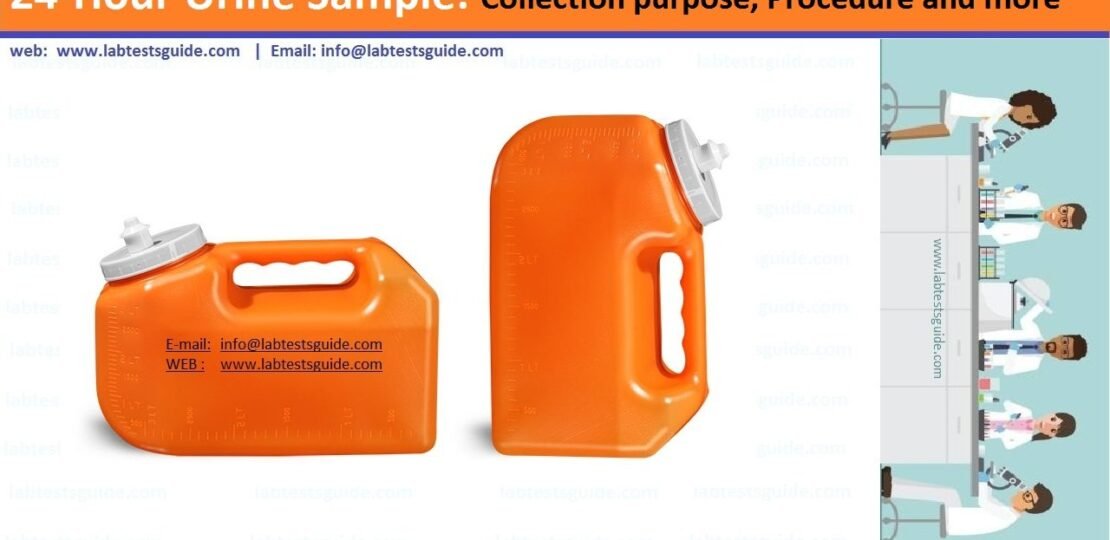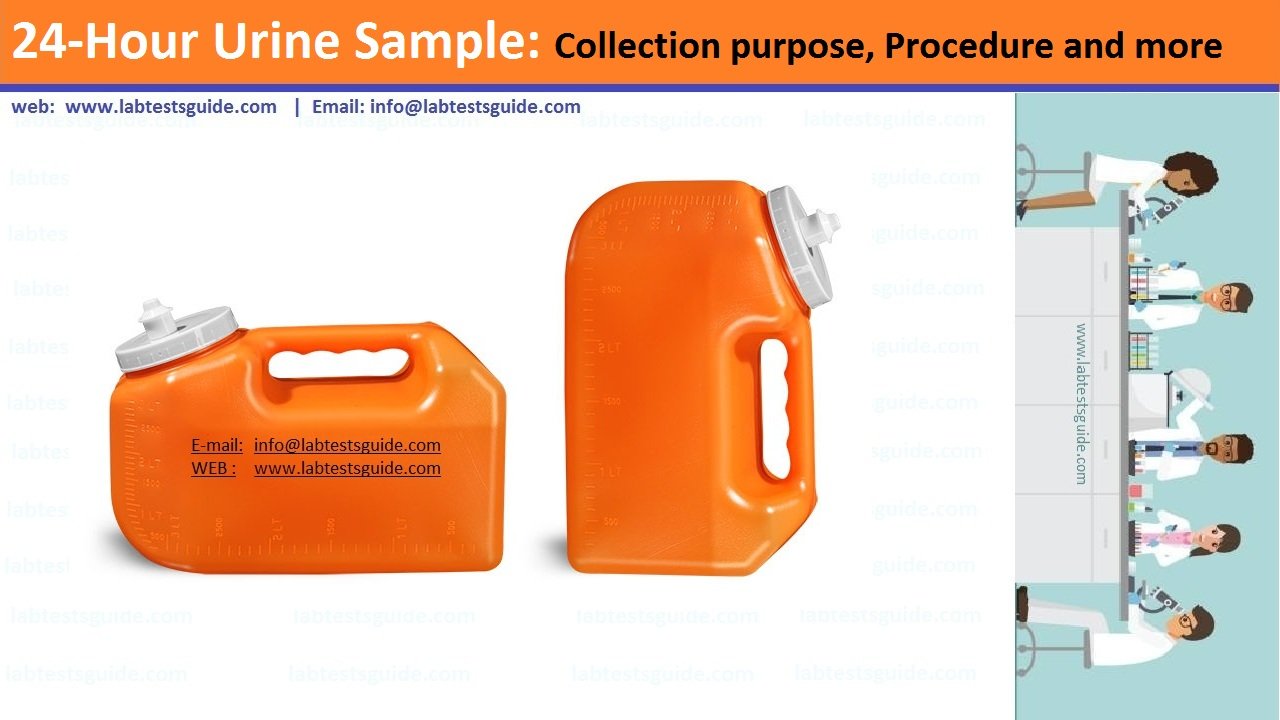
A 24-hour urine collection is a simple lab test that measures what’s in your urine. The test is used to check kidney function. A 24-hour urine collection is done by collecting your urine in a special container over a full 24-hour period. The container must be kept cool until the urine is returned to the lab.

How to Collect Sample:
Follow theses Steps to collect 24 hours sample:
- Label the Container for urine collection
- You should collect every drop of urine during each 24-hour period. It does not matter how much or little urine is passed each time, as long as every drop is collected.
- Begin the urine collection in the morning after you wake up, after you have emptied your bladder for the first time.
- Urinate (empty the bladder) for the first time and flush it down the toilet. Note the exact time (eg, 6:15 AM). You will begin the urine collection at this time.
- Collect every drop of urine during the day and night in an empty collection bottle. Store the bottle at room temperature or in the refrigerator.
- If you need to have a bowel movement, any urine passed with the bowel movement should be collected. Try not to include feces with the urine collection. If feces does get mixed in, do not try to remove the feces from the urine collection bottle.
- Finish by collecting the first urine passed the next morning, adding it to the collection bottle. This should be within ten minutes before or after the time of the first morning void on the first day (which was flushed). In this example, you would try to void between 6:05 and 6:25 on the second day.
If you need to urinate one hour before the final collection time, drink a full glass of water so that you can void again at the appropriate time. If you have to urinate 20 minutes before, try to hold the urine until the proper time.
Storage: The bottle(s) may be kept at room temperature for a day or two, but should be kept cool or refrigerated for longer periods of time.
Why Collect 24 hours Sample:
A 24-hour urine collection helps diagnose kidney problems. It is often done to see how much creatinine clears through the kidneys. It’s also done to measure protein, hormones, minerals, and other chemical compounds.
Conditions that can cause kidney disease include:
- Diabetic nephropathy. This happens when someone has uncontrolled diabetes. It causes high levels of protein (albumin) in the urine and can lead to kidney damage.
- High blood pressure. Abnormally high blood pressure can lead to lasting (permanent) kidney damage.
- Lupus nephritis. Lupus is an autoimmune disease where the immune system attacks the kidneys and damages them.
- Frequent urinary tract infections.
- Prolonged urinary tract blockage.
- Alport syndrome. This health problem causes vision and hearing problems, as well as progressive scarring of the kidneys. The syndrome is passed down through families.
- Nephrotic syndrome. This health problem has several different causes. Symptoms include protein in the urine, low protein in the blood, high cholesterol levels, and tissue swelling.
- Polycystic kidney disease. This health problem causes the growth of many fluid-filled cysts in the kidneys. This makes the kidneys larger. Over time, it takes over and destroys working kidney tissue.
- Interstitial nephritis or pyelonephritis. This is an inflammation in the small structures in the kidney. It’s often caused by infection.
- Screening for preeclampsia in pregnancy. Preeclampsia is a dangerous health problem that sometimes occurs in pregnancy. It causes high blood pressure and can lead to organ failure.
- Kidney stones (nephrolithiasis). Kidney stones form because of an imbalance of minerals, salts and water in the urine.
There may be other reasons for your healthcare provider to recommend 24-hour urine collection.
Risk Factors of a 24-hour urine collection?
A 24-hour urine collection is a safe, easy test. People can collect urine on their own.
Certain factors may affect the accuracy of a 24-hour urine collection. These include:
- Forgetting to collect some of your urine
- Going beyond the 24-hour collection period and collecting too much urine
- Losing urine from the specimen container through spilling
- Not keeping urine cold while collecting it
- Acute stress
- Vigorous exercise
- Certain foods, such as coffee, tea, cocoa, bananas, citrus fruits, and vanilla
There may be other risks depending on your specific health problems. Be sure to discuss any concerns with your healthcare provider before the collection.
Related Articles:
RELATED POSTS
View all

